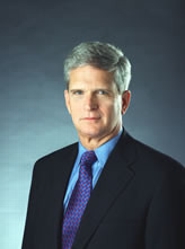
At a Washington, D.C. alumni event, Edward S. Walker, Jr., '62, former U.S. Ambassador and Hamilton's Christian A. Johnson Distinguished Professor of Global Political Theory, lectured on U. S. relations with Iran on Thursday, April 10. In attendance in the Cannon House Office Building on Capitol Hill were current students attending the Washington, D.C. program as well as alumni.
The "lecture" was more of a class in which Walker, former president of the Middle East Institute, fielded questions and posed others to his audience. Walker had assigned required reading in preparation for his presentation, and clearly his attendees had met his request.
The program began with an introduction by Washington's Alumni Council president Paul Reichert '90. Walker then took the podium forewarning the group that they had better participate because he had just come from an exhausting eight-hour meeting in which he had briefed the ambassador to Egypt. He asked the audience what Americans thought of Iran. After a few answers, he flipped the question and asked what Iranians thought of America. "Our perceptions of each other are diametrically opposed, and both think they are the good guys," Walker pointed out. "Perceptions are very important when thinking about different countries."
Walker moved on to outline the modern history of Iran including the current situation in the country. The final part of the lecture focused on the different possibilities of how the world, and in particular the United States, can deal with the ongoing threat. He then answered questions, which ranged from queries on the current presidential candidates to issues of oil and terrorism.
In summarizing our relationship with Iran, Walker concluded, "This is not a problem that is going to go away quickly."
- Eric Kuhn '09
The "lecture" was more of a class in which Walker, former president of the Middle East Institute, fielded questions and posed others to his audience. Walker had assigned required reading in preparation for his presentation, and clearly his attendees had met his request.
The program began with an introduction by Washington's Alumni Council president Paul Reichert '90. Walker then took the podium forewarning the group that they had better participate because he had just come from an exhausting eight-hour meeting in which he had briefed the ambassador to Egypt. He asked the audience what Americans thought of Iran. After a few answers, he flipped the question and asked what Iranians thought of America. "Our perceptions of each other are diametrically opposed, and both think they are the good guys," Walker pointed out. "Perceptions are very important when thinking about different countries."
Walker moved on to outline the modern history of Iran including the current situation in the country. The final part of the lecture focused on the different possibilities of how the world, and in particular the United States, can deal with the ongoing threat. He then answered questions, which ranged from queries on the current presidential candidates to issues of oil and terrorism.
In summarizing our relationship with Iran, Walker concluded, "This is not a problem that is going to go away quickly."
- Eric Kuhn '09
Posted April 12, 2008
